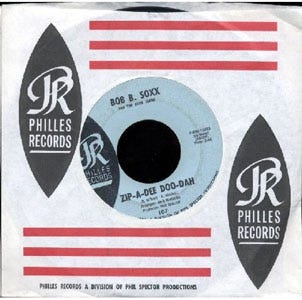Phil Spector and the Death of Madness Chic
How society enables the fashionably insane -- sometimes, until it's too late.
With the death of Phil Spector, I’m reprinting the piece I wrote about him for the Huffington Post in 2009.
Phil Spector was immortalized by Tom Wolfe as the "tycoon of teen" when he was 25. He'll turn 70 this year as a convicted murderer. Time, the great equalizer, has done more than bring Phil Spector down. It has sent him straight to hell.
Mick Brown described meeting Spector, who was wearing a talking wristwatch, in his biography Tearing Down the Wall of Sound:
Now, he said, he was trying to make his life "reasonable."
"I'm not ever going to be happy. Happiness isn't on. Because happiness is temporary. Unhappiness is temporary. Ecstasy is temporary. But being reasonable is an approach. And being with yourself. It's very difficult, very difficult to be reasonable." The wristwatch spoke: "It's six o'clock."
There was a time when that sort of dialog, resonant with undertones of meaning that aren't really there, was considered a mark of brilliance and not of incoherence. We know better now: The watch is making more sense than Phil. But back then insanity was considered dramatic, charismatic, and hip. Jim Morrison reigned, Brian Jones died, and college students in black leather repeated William Blake's line from The Proverbs of Heaven and Hell: "The road of excess leads to the palace of wisdom."
Except that it doesn't usually lead anywhere near the Palace of Wisdom. It leads to Palace of Bloated and Incoherent Rock Stars, or to pointless self-indulgence. Or to death. And the line is from the hell portion of Blake's proverbs. It's time to end the era of Madness Chic.
Show of hands: Who wants to trade places with Amy Winehouse right now?
Phil Spector started his career in 1958 with a song whose title was lifted from a tombstone: "To Know Him Is To Love Him." Somehow he managed to become the leading (and maybe only) exemplar of the auteur theory of pop music production, where he - not the singer or songwriters - was the Artist. Ever alert to the Next Opportunity, he managed to survive the rise of self-contained acts by attaching himself to the biggest one of them all: The Beatles.
He produced some of the great rock records of all time. In response, the world was ready to indulge him in excesses of behavior that in anyone but a Star would have been recognized for what they were: symptoms of severe mental illness and some profoundly dangerous tendencies. But in that warped conflation of madness and hipness, people rolled the juicy stories around on their tongues: He pulled a gun on the Ramones! He attacked John Lennon!
He also produced those artists' worst albums - no surprise, since he was already on the downward slope to Hell. Leonard Cohen's worst album was a Spector production, too, and Spector's assault on Cohen also appears in the Brown biography:
Cohen would later recall how on one occasion in the studio Spector approached him with a bottle of Manischewitz in one hand and a pistol in the other, placed his arm around Cohen's shoulder, shoved the gun in his neck and said "Leonard, I love you." Cohen, with admirable aplomb, simply moved the barrel away, saying "I hope you do, Phil."
Great anecdote, as told by Cohen. But not such a great reality, especially in light of later events. While Cohen enjoys a triumphal return to the stage, his career apparently recovered from Spector collaborations like "Don't Go Home With Your Hard-On," Spector has reached the last stop on the road to excess.
Spector had the money and the fame to resist medical and legal interventions when they might have saved Lana Clarkson and kept him from his unfolding fate. And, since he seemed so glamorously fucked-up, he also had swarms of admirers who appreciated his sickness for the stories it allowed them to repeat and savor. I've been guilty of that myself. We were all, in the language of the day, his enablers.
But maybe we can make an agreement: No more glamorization of mental illness. Brian Wilson was a genius, but he also suffered terribly. Let's not use that for good copy anymore. Pete Doherty? A talented guy, but he's ruining his own life and probably others too. That Byronic thing of yours, Pete? It's been done. Get some help, friend. Warren Zevon turned back from that road when he saw that "it's not that pretty at all." You can, too.
These guys aren't killers in the making, but they ain't exactly well.
Besides, where did Madness Chic ever do for its fashion victims except enslave them to the unstoppable cruelty of time and decay? The jury rendered its verdict some time after 5 pm yesterday. Was Phil Spector wearing that talking watch in court? If so, it spoke some of the first words he would hear as a convicted killer facing his own kind of Hell:
"It's six o'clock."

